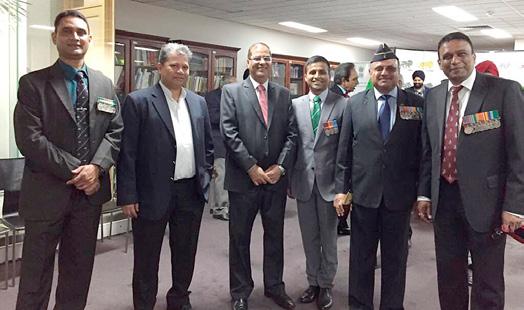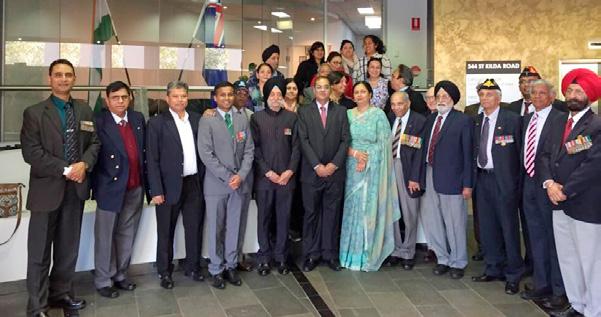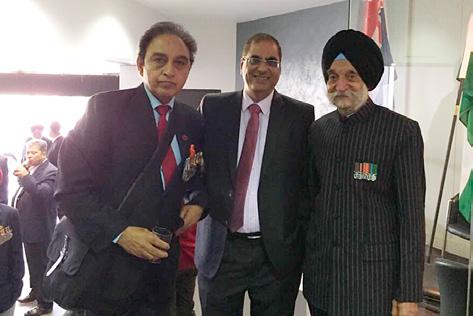
4 minute read
Indian Anzacs
from 2018-05 Melbourne
by Indian Link
Marching in memory of their forebears at Gallipoli, Indian veterans bring up the idea of an Indian commemoration
BY RAJNI ANAND
Having participated in the ANZAC Day Parade for a few years now, many of those who march as part of the Indian contingent are beginning to feel that perhaps India should organise its own memorial event.

Indian involvement at Gallipoli in 1915 is now a well-recognised fact, with documentation including photographs and letters unearthed after many years.
Some 1.3 million Indian soldiers served in World War I, and over 74,000 of them lost their lives, 1,400 of these at Gallipoli alone. Many were awarded the Victoria Cross honour.
Just the like the Aussies and New Zealanders, they fought a war in a strange land far from their own, and against an enemy they knew little about.
The Indian contingent at Gallipoli comprised the 7th Indian Mountain Artillery Brigade, 29th Indian Infantry Brigade, Indian Supply and Transport Corps, and the 108th Indian Field Ambulance, among others. They served there from late April 1915, through the August offensive, until the final evacuation in December.
“If Australia and New Zealand can go to
Gallipoli every year to lay a wreath to the memory of their soldiers, why shouldn’t India?” asks Col Nilesh Bansal (Retd), who has been a proud ANZAC Day participant in Melbourne since 2013.
“I’ve spoken to Indian officials about this,” Bansal reveals, “and I am saddened to learn that apparently the Indian political system and bureaucracy do not recognise or honour conflicts that took place before 1947, considering the participants as ‘part of British forces’.”
Major General Ranjit Nadkarni (Retd), Vishisht Seva Medal, who led the 20-strong Indian contingent at Melbourne’s ANZAC Day parade again this year, feels that the annual ceremony including the dawn service, parades and observances at RSL to honour our veterans, mean a lot to men in uniform.
“These ceremonies give respect to all armed forces personnel,” he tells Indian Link. “They are made to feel a valued section of the community. In India we don’t get such recognition, at least not to this extent.”
He adds, “I would like to see something of this nature in India, definitely. We do have the Republic Day ceremony but it is a mixed affair, with various other services and states taking part.”
Taking a cue from the Australian observance of ANZAC Day, he goes a step further and says that perhaps India should set aside an annual day to celebrate the nation’s military history.
“I think the Armed Forces must be given due recognition for their efforts, and their service remembered. The 1971 conflict, for example, in which I myself participated, created international history, giving rise to the birth of a new nation, Bangladesh. And over and above their roles in conflict and border protection, the Forces take on many challenges as part of their humanitarian duties such as during natural calamities. The nation owes the Armed Forces. We should set aside a day for military personnel alone, besides Republic Day.”
The Indian Consulate in Melbourne hosts a lunch every year to honour the Indian marchers, and both Bansal and Nadkarni have expressed the sense of pride they feel, as members of the community – both Indian and mainstream – come up and greet them as military officers who served their country with devotion.

“Of course, there are people who recognise and value our service in India also,” Nadkarni reveals. “When I go to the bank in India for instance, I am amazed at the regard shown to me simply because I am a soldier. But there’s no public forum for such acknowledgment. I think it can be done: the retired community will happily work alongside the serving community to make this happen. Such a move will do the country proud, I feel.”
Gen Nadkarni served in the Indian Army for 38 years. As an Infantry officer he saw action in the 1971 war as a young major, and later in Kashmir fighting terrorists.
As part of his long career he also served as Chief Instructor of the Army at the prestigious Defence Services Staff College at Wellington, Tamil Nadu.
“I taught military history and am fully aware of the battles that took place in Gallipoli in 1914-15,” he offers. “My brigade the 1st Battalion of the Sikh Regiment was particularly active there and this is a great source of pride for me. The Gurkhas and others from India did their bit equally valiantly and we are proud of their service and sacrifice.”
Having marched in the ANZAC Day parade for the 11th year this year, he says, “I felt proud to be Indian and an ex-Army officer. I felt proud that there is some recognition for Indian soldiers.”
His words are echoed by Col Bansal, who describes in some detail putting on his regimental cap and tie and pinning on his medal accoutrements in preparation for the parade. “I was proud to be marching as a representative of our veterans who participated at Gallipoli,” he tells Indian Link

Having served in the Indian Army for 22 years, he counts his 12 years in Kashmir (including Siachen) in counter insurgency operations as his high points. He talks with pride about raising and commanding a Brahmos (surface to surface supersonic cruise missile) regiment, making it to the prestigious Defense Services Staff Course and serving as part of the United Nations Peace Keeping Force in Ethiopia and Eritrea.
“Walking through the WWII cemetery in Ethiopia, I came across tombstones of many Indian soldiers,” he recalls. “They lie there forgotten. If we don’t honour our soldiers, who else will? It’s good to see our current prime minister, Narendra Modi starting to make an effort now.”
Many Indian Army regiments do so at their own levels, he points out. “It is heartening to see that the old battles and sacrifices are still remembered at least at this level. I think that we as a nation should honour our soldiers; whichever banner they fought under, they were Indian at the end of the day.”























































































